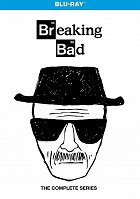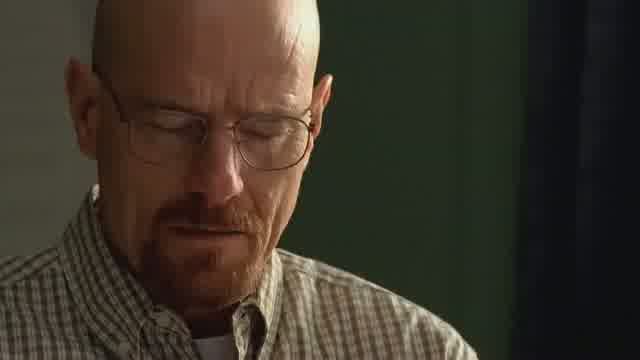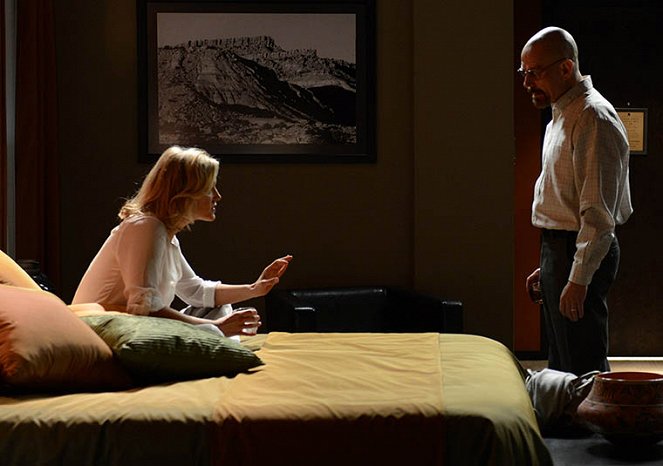Stoffentwicklung:
Vince GilliganMusik:
Dave PorterBesetzung:
Bryan Cranston, Aaron Paul, Anna Gunn, Dean Norris, Betsy Brandt, RJ Mitte, Bob Odenkirk, Jonathan Banks, Giancarlo Esposito, Jesse Plemons (mehr)Streaming (4)
Staffel(5) / Folgen(62)
Inhalte(1)
Ein krebskranker Chemielehrer tut sich mit einem ehemaligen Schüler zusammen, um die Zukunft seiner Familie durch die Herstellung und den Verkauf von Meth zu sichern. (Netflix)
Videos (12)
Kritiken (10)
Seit Six Feet Under - Gestorben wird immer habe ich keine neue Serie gesehen, die mich so begeistert hätte. Vor allem die Verwandlung der Hauptfigur (ich werde nicht "des Helden“ schreiben) ist etwas Unglaubliches. Und das, wie heftig die Drehbuchautoren mit den Sympathien der Zuschauer*innen spielen und wie es ihnen völlig egal ist, ist bewundernswert. Keine Folge schien mir überflüssig zu sein, in keiner wurden leere Gespräche geführt, obwohl ständig gesprochen wurde. Die präzise geschriebenen Dialoge habe ich genauso wie die Momente genossen, in denen sich die Figuren nur angeschaut haben und die Stimmung schwüler wurde. Es waren ausgezeichnete fünfzig Stunden.
()
Season 1 – 90% – All expectations turned upside down. Potentially annoying scammer Jesse is my favorite character from the first scene onwards, potentially annoying caring Skyler positively surprises me with every decision. I want to know as much as possible about both of them, I want to see more of the main hero's abilities to get out of the worst situations, and ultimately, I just want to see where such a series can go. I didn't find any superficiality or false glamour of the drug trade here, quite the contrary. It starts as a genuinely restless family drama set in the unfortunate/lucky backdrop it can unfold. My biggest wish is for it to continue in this humane manner. Season 2 – 70% – I enjoyed it when Walt fought with his own morals in the name of his family, but I don't enjoy it when he tramples over his family and their values and only uses his original goals as an excuse. As my sympathy for the main character decreases, so does the quality, because his constant arrogant and rude behavior towards his (no matter how silly and naive) partner breaks my heart, just like Walt's way of making decisions in key situations, such as the obvious moral dilemma in the final episode, Phoenix. It's a shame, because there is still a lot of potential, and the outlook is becoming significantly darker. Hank, on the other hand, is working his way up to become the most charismatic TV cop. Season 3 – 80% – Some actions lead down a complicated path, but others don't. After the events of the previous season, the main character is still the deserved attraction for me, but I can't root for him, mainly because of his lack of self-reflection and sufficient repentance. On the other hand, the underrated Pinkman, thanks to Aaron Paul's perfectly human performance, becomes the driving force of the series in every aspect. However, the creative and incredibly suspenseful level of the show is truly restored only in the final two episodes, during which I hardly breathed due to nervousness, and I truly appreciated Giancarlo Esposito's nearly anti-mimic acting performance. Season 4 – 75% – Most AMC shows, in their exploration of interesting topics, reach a critical point where breathtaking twists start to thin out, and the humane approach begins to border on boring stagnation. Breaking Bad reached this point precisely in the hype of the fourth season, and there were times when I thought that any further dialogue between Walt and Skyler about the "car wash" could kill me. Fortunately, the second half of the season, which again deeply delves into the relationship between Jesse and Walt and introduces Jesse and Gus and Jesse and Mike relationships, is completely different in terms of tension. The dramatic ending of the last episodes cleverly presents a great climax, and it is a pity that Vince Gilligan often can't restrain himself and lets impressive scenes go too far. The building of an overwhelming pressure from all sides is as claustrophobic, if not more, as the previous season. Season 5, first part – 80% – Walt is unbearable. I never understood his popularity, and now, when the inconspicuous psychological terror against the depressed Skyler has finally reached its peak, I am sickened by Heisenberg's boastful monologue to the point of nausea. Although Bryan Cranston still has surprises up his sleeve even in the fifth year, the development of his character has disgusted me for a long time. I praise Gilligan for it, as well as Jesse's definitive maturity and the pervasive sense of the inevitable beginning of the end, led by the episode Dead Freight, probably the best episode of the entire series. Season 5, second part – 90% – Saving the best for last. If it weren't for a few missteps that, nonetheless, reflect the development of the entire series, it might even be an absolute rating. Nevertheless, I was given eight episodes that leave such a strong impression that I could easily forget about the weaker periods. It is here, at the moment when everything is falling apart and literally all characters are on the verge of disaster, that you can best see who has grown closest to our hearts. And when I reminisce about Breaking Bad, I will always be grateful for giving me one perfectly complex character that quickly became one of my all-time favorite TV characters. Unlike most viewers (whom I will never understand), this character is not Heisenberg, Walter White, a self-absorbed villain, no matter how we may call him. In my eyes, it is the broken and perpetually stumbling addict and unfortunate soul, Jesse Pinkman.
()
(weniger)
(mehr)
A television series written and filmed with the same conscientiousness with which Walt cooks Blue Sky. The following selection from the SPOILER-packed observations that I have written over the course of all five seasons isn’t intended to be a comprehensive analysis, but a means of partially covering what makes up the extraordinary nature of Gilligan’s achievement by breaking down several constituent aspects of the series. ___ Throughout the series, the development of the narrative seems to be determined by Heisenberg’s principle of uncertainty. Based on the anticipated direction of development (from victim of external events to manipulative monster), it’s impossible to guess when something will go south and who will undergo a change in personal character. Breaking Bad is not accommodating toward viewer expectations in that it rejects the usual narrative formula. It disconcerts us with its efforts to raise the plausibility of ongoing events, creating the impression that almost anything could happen. However, it does not discourage us from forming our own hypotheses. On the contrary, through the “forward looking” scenes in the prologue, it rather encourages us to actively insert what we see into the narrative as a whole. Suspense is created based not only on the viewer’s uncertainty with respect to what will happen, but also on the knowledge of what the character knows or doesn’t know. The series’ creators work with multiple narrative focal points and pit the characters conflicting interests against each other, so that the characters frequently have to face risks coming from different areas (immediate and extended family, institutions, the underworld). The transformation of our perception of the characters is tied to what we know of them, how much we respect them and how many moral transgressions we are willing to forgive them for. It is fascinating to watch the purposeful “dirtying” of the protagonists. In the final season, it will be hard for you to find a character who is without guilt. The increasing risks taken force the characters to think farther ahead, thus making them better players. The self-stylisation and pretence don’t do any good for Jesse in particular, who is perhaps the weakest personality, but he is also the one to whom the most powerful cathartic effect is bound in the final episode. ___ The real antagonist of most of the characters is their own potential, which they either fail to fulfil (through their own fault and that of the system, which repeatedly discourages them) or they fulfil it at a disproportionate cost. The protagonists are also united by their ambiguity. Each of them can step out of his role, whether he accepted it voluntarily or under duress. Because nothing is fixed and we are forced to assess the given choices of a given character in the context of his previous actions, it is possible to also doubt Walt’s admission in the final episode that taking care of his family was only a pretext for choosing a life of crime (on which he embarked for his own selfish reasons, not to provide for his wife and son). Was his motivation from the beginning really anything other than power and money? We are aided in the reassessment of our opinions on the characters by the use of parallels (Hank as a substitute father for Walt Junior, Walt as a substitute father for Jesse), which lead us to see similar situations in different contexts and point to some key themes of the series. ___ Through his career as a drug kingpin, Walt vents the aggression that he has built up from numerous sources. He failed as the breadwinner of his family, nor did he fulfil expectations as a father figure (his son gets advice on how to be a man from Hank). Through his other life, he also compensates for the breakdown of his own body. He makes money outside of the system also because he was excluded from it due to his illness. He is rejected by society because, as a person with cancer, he signifies death (the “other”). Cooking meth makes it possible for him to overcome the substitute father and husband figures and to put his exceptional intellect to use at least outside of the official structure. He holds on to his faith in the traditional, or rather obligatory model of the family for a long time. Only in the series finale, no longer bound by anything, all-powerful and capable of anything, he can give full expression to his potential and fully transform into the person he was perhaps destined to become from the beginning. ____ The extraordinary thematic scope of the seasons makes Breaking Bad rewarding material for a sociological study on the anxieties of contemporary America (drugs, money, terminal disease, an ineffective social-security system). Those who want to make it cannot respect the law and must endlessly build up the façade of an upstanding citizen through hundreds of small lies. Many times, the series relativises the distinction between “big” lies with broad reach and small family lies. Hypocrisy is the essence of both. Instead of learning greater openness, the protagonists become ever more adept at constructing alternate worlds and coming up with reasonable stories (Walt as a gambler). As everyone gradually finds out, however, the real drama plays out behind these false fronts. It is fascinating to watch how the screenwriters lead the characters into a multi-level web of lies and how they deal with their various degrees of knowledge about the existence of particular worlds and their supposed inhabitants, family, the underworld; these worlds are at first more distinctly different also artistically, but all of them gradually “darken” into the same colour palette). ___ Breaking Bad is also extremely satisfying in terms of its style, which changes not only in the course of single episodes, but also in individual scenes (through recontextualization and/or the revealing of new information, we are prompted to see a given scene from a different perspective). With the graphic continuity of shots, action played out on multiple planes and creation of meanings through camera positioning and movement, the series’ creators succeeded in doing much more than many Hollywood productions with a hundred times the budget. I could endlessly watch the Scorsese-inspired edited collages, while the emblematic space of New Mexico hasn’t been used for such a thrilling dusting off of classic western motifs (the train robbery) for years, and in terms of directing, the final episode can boldly compete with any of Hitchcock’s better thrillers. There is much that could still be written, but the tone would remain just as praiseful. Breaking Bad contains so much that is positive that I consider it to be petty to mention its few minor flaws. It doesn’t often happen that a series allows you to be practically uncritical. And I give thanks for that! 100%
()
(weniger)
(mehr)
Living the American Dream via the periodic table and Heisenberg’s principle of equivocality which is not black-and-white, but that doesn’t mean that it contains no black or white. When a middle-age crisis hits an over-qualified, kind chemistry teacher with a complex, whose prizes family above all else (his wife is an accountant against her will and also an unsuccessful writer with a few published stories, his son has polio and is going through a rough puberty and there’s even an unplanned kid on the way); this is already a powerful theme in itself. And when you add a trick of fate in the form of advanced cancer, this is doubly powerful. It is clear that here we will get a combination of satire and drama with a precisely dosed admixture of black humor. And what if, to provide for his family, this hen-pecked chemistry teacher decides to “kick off the hen and declare a vendetta on fate"; in other words once and for all (and for the last time) to take his life into his own hands... So he sets out on the slippery slope of crime as a “Meth Cook", with a former pupil who was one of the laziest and most useless in the class, Jesse; which forms the recipe of an uncompromising, raw, cynical crime series where you find yourself breathing in the rhythm dictated by the creators, not by your own body. The only respite (which is no criticism - it fits here) occurs at the beginning of season three when the creators give the characters the opportunity to get off the careering train and return to their original, “non-criminal" routine. But if this seems like a disparate mixture of genres and themes, the truth is in exact opposite. Unusually well written (both characters and story; just a shame about the exceptions proving the rule in the Lost-style intertwining of fates during the final of season two) and presented (nobody else has yet come near to the prologs to each episode) and also never losing its worrying, chilling tone and very movie-like guise (it is markedly Coen-McCarthy-esque); and not just in TV production terms. But there is one snag. It definitely isn’t for people who need to identify with one of the characters. Of course, you understand (but may not approve of) the characters and their behavior in all situations, but the more this pedantic teacher Walt who you would trust with your wallet “becomes" Heisenberg, who commands respect and fills you with pure fear (If that's true, if you don't know who I am, then maybe your best course would be to tread lightly.), the more clear it becomes that you can’t root for him because he starts not seeing the wood for the trees, which means he not only harms his surroundings, but also his nearest and dearest. And mainly he is never under any circumstances the victim of circumstances or screenwriters, but is always fully responsible for everything that happens to him. And so it is with everything. In any case, if you get into the vibe of the series, you have a good chance that you will find a hot favorite for your most favorite episode of all existing series (there are countless candidates for this in all seasons, but the clear winner is Ozymandias), for the award for best scene of all existing series (there are more candidates for this than for the episode prize, but the clear winner here is Crawl Space) and of course for the award for best series of all top series. PS: And like the very end held no disappointment at all, it seems like, in spite of all the horrors experienced by others, Walt got off lightly in comparison. The very end lacks a certain hidden uncompromising streak which for instance raises The Shield onto the highest pedestal for the best and most memorable finale ever.
()
(weniger)
(mehr)
Seeing Breaking Bad makes me want to extract the ricin from the beans, but that's essentially my only complaint. This is the first series since The Wire that honestly fascinates me with its attention to plot sophistication, fictional characters, and, most importantly, absolute unpredictability. I gave up guessing the storyline halfway through the second season because there's no point. The way in which Walter White, who learns the value and brevity of human life from one day to the next, functions on both sides of the law while (un)consciously pulling in people around him is perhaps even better than in Dexter. This is mainly because the moments when we realize that he is really becoming evil are conveyed by the filmmakers through complete banality. Like ordinary marital conversations: "I'm not in danger." I am the danger!"
()





